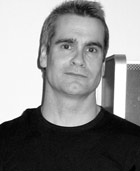Henry Rollins: Eternally optimistic punk-idol politico
His latest speaking tour is winwin for the more-than-musician, who goes stir crazy within an hour of any tour's conclusion. While touring, he gets to introduce himself to new venues, and he gets to work. Rollins is no stranger to, and has come to crave, hard work. Already over a dozen books into his writing career, his continued passion shows no sign of slowing.
 Known in the '80s as the lead
singer of Black Flag, and then for
creating Rollins Band as the '90s
drew near, only the most dedicated
fans would know the real passion
with which the man seizes life.
Rollins does like to be idle, but he
uses the opportunity to travel
between tours to learn about the
world in which he lives. Rollins is
a champion for society. He is an
exposer of propaganda and political
intrigue.
Known in the '80s as the lead
singer of Black Flag, and then for
creating Rollins Band as the '90s
drew near, only the most dedicated
fans would know the real passion
with which the man seizes life.
Rollins does like to be idle, but he
uses the opportunity to travel
between tours to learn about the
world in which he lives. Rollins is
a champion for society. He is an
exposer of propaganda and political
intrigue.
During the 15 minutes leading
up to showtime in Halifax, the
excitement is palpable. A sound
tech has come to the stage twice,
and each time he enters the darkened
stage he meets “Woo,
Henry!” and exits to “Aww.”
Finally, the lights come up and
Rollins crosses the stage to the mic
at centre. The crowd literally
erupts into cheers and Rollins'
bows begin. After about a half
dozen bows he starts talking and
the crowd quickly hushes.
Not one to mince words or avoid
uncomfortable topics, Rollins
addresses his age right away. “I
started touring when I was 20. I'm
49 today. I'm not going to grow up
and do something someday.
Someday is now. I'm old. I'm not
89, but I'm 49.”
The man has been in the public
eye since 1981 when a chance offer
to sing one song with his favourite
band led to the front slot the following
year. He has been working
as an entertainer since his late
teens. Either way, you wouldn't
know it to watch the man on stage.
Moving quickly through his discussion
points, of which there are
many, Rollins gets to the inevitable
discussion of Canada versus
America. “I know, sometimes you
look at America as an odd spectator
sport. A surreality show.”
Although Rollins acknowledges
the George W. Bush years with a
mix of bemusement and disdain,
America is the country he loves.
Some of the people, though, he
could stand to do without.
On recent news out of
Mississippi - where a lesbian student
wanted to take her girlfriend
to the prom, so the prom was cancelled
and ruined for all students
- Rollins describes the administrators
as “Dim-witted, smallminded,
hate-filled, fear mongers.”
Reminding the audience that he
can never understand what it
means to be gay, Rollins is quick to
make the point that he knows how
hard it is to be a teen and could
imagine contemplating suicide if
one more method of alienation was
added to the mix.
Moving on with the topic, he
recounts his experience as a guest
judge on season two of RuPaul's
Drag Race. He goes on to talk
about the eerie hotness of a punkrock
drag queen who crept into the
tail end of that evening's “tension
relief.” It's the ease with which he
relates the story that is most entertaining.
No matter the topic,
Rollins injects hilarity throughout
the discussion.
Turning to federal politics in the
United States, Rollins offers equalopportunity
mockery. He discusses
young and old, Democrat and
Republican, and the diatribe focuses
on experience and education.
Doing an impressive George W.
Bush impression: “We
democrafied the Iraqians.”
As a passable Barack Obama: “I
... speak ... in perfect ... 12-point
... Helvetica. You can hear ... the
punctuation ... in my speech ...
period.”
Turning his attentions to Senator
John McCain's nonverbal communications
during stump speeches:
“He always starts with ‘My
friends,' but then you look at his
body language and he's really saying
‘Where's my soup? I'm cold! I
don't feel like talking!'”
The crux of the evening is that
people need to be educated.
Rollins suggests that it is the
responsibility of each student to be
curious. It is our responsibility to
pursue “higher knowledge” so that
we can affect necessary change. He
says we need people who are
visionaries - who look at the
world and think long term. We
must “see the world in terms of
sustainability.” We must, according
to Rollins, be the kind of people
who want to take care of our own
generation and then 50 more generations
to come after us.
At three hours, I was amazed
that time passed so quickly, and yet
so much got covered. We discussed
age, sexual orientation, globalization,
world politics and education.
Rollins had a story about many of
the impoverished nations he's visited
and how the human spirit radiates
from even the darkest of shadows.
But the point is that if we
learn about the world, we will learn
to stop idealizing it.













